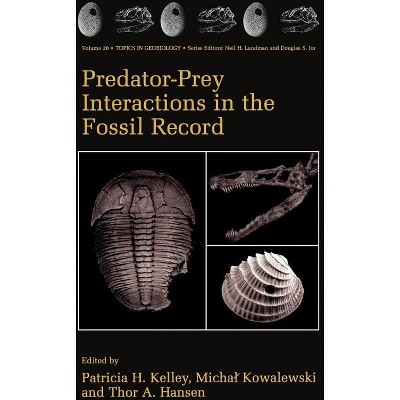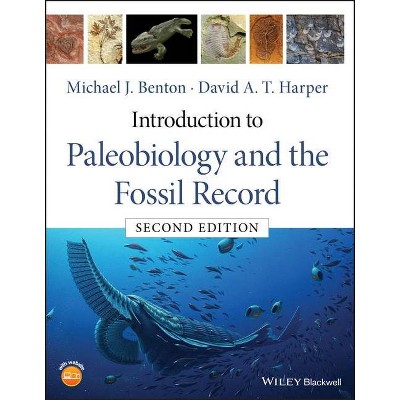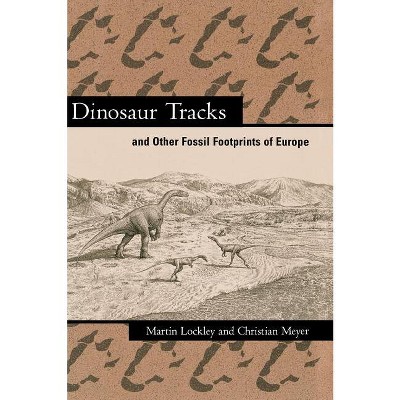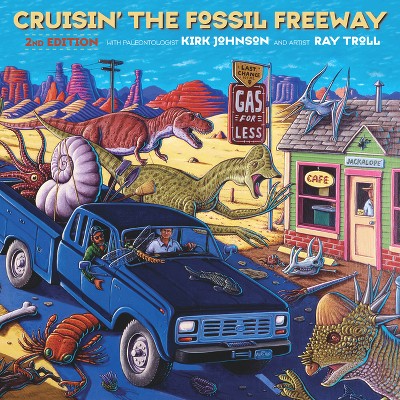Sponsored

Rereading the Fossil Record - by David Sepkoski (Paperback)
In Stock
Sponsored
About this item
Highlights
- Rereading the Fossil Record presents the first-ever historical account of the origin, rise, and importance of paleobiology, from the mid-nineteenth century to the late 1980s.
- About the Author: David Sepkoski is a senior research scholar at the Max Planck Institute for the History of Science.
- 440 Pages
- Science, Paleontology
Description
Book Synopsis
Rereading the Fossil Record presents the first-ever historical account of the origin, rise, and importance of paleobiology, from the mid-nineteenth century to the late 1980s. Drawing on a wealth of archival material, David Sepkoski shows how the movement was conceived and promoted by a small but influential group of paleontologists and examines the intellectual, disciplinary, and political dynamics involved in the ascendency of paleobiology. By tracing the role of computer technology, large databases, and quantitative analytical methods in the emergence of paleobiology, this book also offers insight into the growing prominence and centrality of data-driven approaches in recent science.
Review Quotes
"A significant archival achievement. . . . By giving us the institutional, intellectual, and disciplinary developments that resulted in the emergence of palaeobiology as a new research agenda for palaeontology, Sepkoski has provided all scholars interested in the course of evolutionary theory with an invaluable history. . . . One can hardly help reading Sepkoski's book and not have the desire to continue writing the story of evolution in the post-synthesis era. He has carved out an impressive story in the details of this group of palaeontologists, and made a significant contribution to histories of science concerned with the role of disciplinary formation in the shaping of theory and research agendas in the natural sciences."
"David Sepkoski's book is the first to examine the rise of paleobiology and the emergence of macroevolution as a discipline in the 1970s. These advances shook the fields of biology, geology, and paleontology and established a cadre of major questions that have been pursued ever since. The subject is one of the three main advances in evolution in the twentieth century, the others being the rise of the 'modern synthesis' and the advent of 'evo-devo.' It is rare to be able to give such high marks for the treatment of both the science and the history, but this book deserves such praise. An essential for every evolutionist's bookshelf."--Kevin Padian, University of California, Berkeley
"David Sepkoski's book is the one book that anyone interested in evolution should buy this year. And next year. And probably the year after. The reason is that, for the first time, the emergence of the modern science of macroevolution receives its due. . . . Waste no time, not merely adding this to your bookshelf, but in reading it and marveling how so few people revolutionized our view of the past in such a very few years."-- "Reports of the National Center for Science Education"
"David Sepkoski's narrative shows us how the science of paleontology was transformed in the later twentieth century by the energetic activities of a quite small group of talented individuals. Their journal, Paleobiology, gave their movement a name and an institutional identity, but also an outlet for their radical research program. Foreseeing at an early stage the huge potential of computers, they turned the analysis of the fossil record into a component of evolutionary theorizing that could no longer be ignored or marginalized by the dominant 'modern synthesis.' This is a book from which both evolutionary biologists and historians of twentieth-century science will have much to learn, and it is so readable that they should all enjoy the experience."--Martin J. S. Rudwick, author of Worlds Before Adam and Bursting the Limits of Time
"For those potential readers interested in the history of the diversification of life on Earth and/or those biologists interested in the impact of such paleontologically derived concepts such as punctuated equilibrium, mass extinctions, or species selection, this book is extremely important."-- "Perspectives on Science and Christian Faith"
"One measure of the greatness of a work is that the characters who play roles in the narrative feel its essential truth. As someone who is proud to have been there during much of the action David Sepkoski describes, I give his description and analysis of the history of paleobiology a five-star rating; to my mind, this actually was the way it was."--Niles Eldredge, American Museum of Natural History
"Rereading the Fossil Record is a good story, superbly well told. It should be of great interest to historians, philosophers, and scientists concerned with the biological and geological sciences. . . . This first book-length treatment of the paleobiology revolution provides a superb basis upon which to launch historical dissertations and should help redirect philosophers of science more strongly toward macroevolutionary and paleobiological dimensions of evolutionary biology."--James Griesemer, University of California, Davis "HOPOS"
"[Rereading the Fossil Record] will be read with interest and profit both by historians of twentieth-century science and evolutionary scientists."--Irina Podgorny "Metascience"
"[A] superb book. . . . For what it tells us about paleobiology in particular and about twentieth-century discipline building in general, Rereading the Fossil Record: The Growth of Paleobiology as an Evolutionary Discipline could hardly be bettered. It is lucid in explaining sometimes technical research, sympathetic in explaining why individuals did what they did, and deft in weaving together the intellectual and the personal strands of its story."--Gregory Radick, University of Leeds "Journal of the History of Biology"
"[F]ascinating."--Lukas Rieppel "Endeavour"
"An exceptional book, Rereading the Fossil Record draws wisely and appreciatively on the work of fellow historians of science (to mention just a few: Ronald Rainger, Joe Cain, V. Betty Smocovitis, Michael Ruse, and Sharon Kingsland). But it stands on its own as a major contribution that will interest biologists, historians more generally (it's not only good history, it's about history), and philosophers alike."--John Beatty "Science"
"In the 1970s, a new kid on the block was shaking up palaeontology, geology and biology. Historian David Sepkoski charts the rise of palaeobiology from 1945 to 1985, driven by a small but illustrious band of palaeontologists including Stephen Jay Gould and David Raup, who grappled with how the geological record could produce evidence for evolution. The solution, as Sepkoski engagingly relates, lay in quantitative analysis of evolutionary patterns in fossils."-- "Nature"
"Insightful and excellent. . . . A historian of science, Sepkoski has melded a historian's detailed documentation with a clear description of the science itself and perceptive insights into the personalities of the key players. In addition to oral interviews, Sepkoski has taken full advantage of preserved personal correspondence, as well as the ar-chives of the Paleontological Society and its journals. These reveal the frank and not uncommonly acrimonious discussions among the major players. . . . This book should be on the shelf of every professional paleontologist. It should also be required reading for every student entering the field. They will gain insights not only into the science of paleobiology, but a far better understanding of how science as a discipline works."--Roy Plotnick, University of Illinois at Chicago "Priscum"
"This book is a deliciously detailed account of the rise of paleobiology, built on archival records, correspondence, and interviews. . . . A valuable acquisition for all libraries with science and history of science collections. Highly recommended."--M. A. Wilson, College of Wooster "Choice"
"This exercise in recent historiography is enormously valuable and welcome."--Michael J. Benton, University of Bristol "Trends in Ecology & Evolution"
"This splendid book tells a fascinating tale; here we find the gentlemanly Norman Newell, the young tigers Niles Eldredge and Stephen Jay Gould, the brilliant, prickly Tom Schopf, the innovative David Raup, the late Jack Sepkoski (father of the author), Steven Stanley, James Valentine and many other extraordinary personalities. We read of their insights, interactions, disagreements, quarrels, personal lives and contributions."--Euan Clarkson, University of Edinburgh "Times Higher Education"
About the Author
David Sepkoski is a senior research scholar at the Max Planck Institute for the History of Science. He is coeditor, with Michael Ruse, of The Paleobiological Revolution: Essays on the Growth of Modern Paleontology, also published by the University of Chicago Press.










